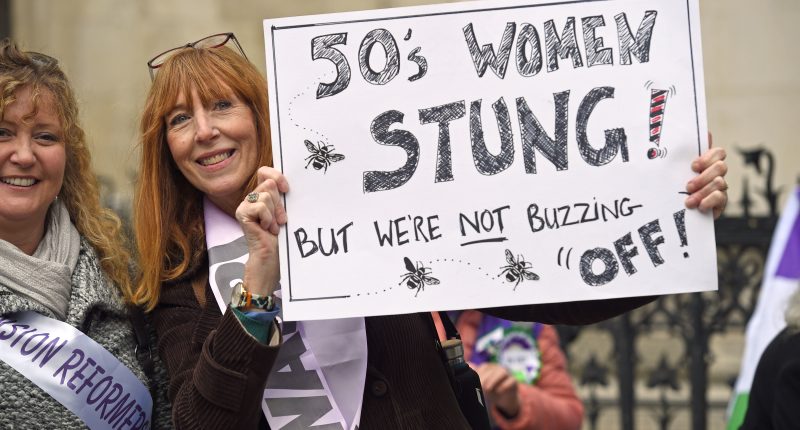TENS of thousands of women are owed compensation by the government, a landmark report has found.
Official findings published today by an ombudsman have called for WASPI women to be compensated over DWP “failings”.
The Parliamentary and Health Service Ombudsman (PHSO) has issued the report following an investigation into possible injustices resulting from raising women’s retirement age in line with men’s.
Those affected are referred to as WASPI (Women Against State Pension Age Inequality) and are those who saw their pension age go up from 60 to 65.
These women were born in the 1950s and were told they would have to wait longer for their retirement cash when the changes to the state pension age were accelerated in 2010.
The watchdog published the first stage of its report back in 2021, which criticised the government for being too slow to inform women how they would be affected by the age change.
READ MORE IN MONEY
It’s now published the second and third parts of its investigation, which deal with those communication failings and recommendations on compensation.
The 100-page report suggests that compensation could be between £1,000 and £2,950 per person – this is a level four on its scale of injustice.
The PHSO told The Sun it estimates that upwards of tens of thousands of women are due compensation.
Campaign group WASPI had previously called for each affected woman to be paid between £10,000 and £20,000 (level six) to make up for the lost pension payments.
Most read in Money
To date, the Department for Work and Pensions (DWP) has not acknowledged its failings nor put things right for those women affected, according to the report.
The ombudsman has now asked Parliament to intervene, saying it “needs to act swiftly” and make sure a compensation scheme is established.
The report also says that based on what the pensions department told its authors during the investigation, the ombudsman “strongly doubts it will provide a remedy”.
So it’s important to bear in mind that a payout is far from guaranteed and no scheme is in place currently.
Parliamentary and Health Service Ombudsman chief executive Rebecca Hilsenrath, said: ”The UK’s national ombudsman has made a finding of failings by DWP in this case, and has ruled that the women affected are owed compensation.
“DWP has clearly indicated that it will refuse to comply. This is unacceptable. The department must do the right thing and it must be held to account for failure to do so.
“Complainants should not have to wait and see whether DWP will take action to rectify its failings.”
Legally, the watchdog isn’t able to recommend the government reimburse women for the full amount of pension they did not receive.
However, it can recommend that at least some of those impacted receive payments, though it is not yet known how any compensation scheme would work.
It could be tricky to work out who actually is eligible for the cash, and nothing has been guaranteed by the government so far.
Some critics have said that a blanket payment scheme wouldn’t be able to distinguish between people who knew their state pension age was going up and others who hadn’t been properly contacted by the DWP and had suffered as a result.
It would also be pretty expensive, running into billions of pounds for the government.
The DWP has been contacted for comment.
Who are WASPI women?
WASPI women refers to an estimated 3.8million women born in the 1950s who have been badly hit by a change in state pension age from 60 to 65.
The acronym stands for Women Against State Pension Inequality.
The women represented were born between April 6, 1950, and April 5, 1960.
Up until 2010, women could claim their state pension from their 60th birthday and men from 65.
But, from 2010 to 2018, the pension age for women gradually increased from 60 to 68, bringing it in line with men’s state pension age.
The women affected by this say the changes were implemented with little notice, leaving them without enough funds.
The shake-up was introduced by successive governments in 1995, 2007, and 2011 to bring women’s state pension age in line with men and to account for the fact that people are both living and working for longer.
Angela Madden, chair of the WASPI campaign, previously told The Sun: “More than 260,000 WASPI women have died since the campaign began and this tragic statistic reconfirms the urgent need for justice for all those affected, following the repeated failures by the DWP and successive administrations of all colours.”
What is the WASPI campaign?
The WASPI campaign was set up in 2015 in a bid to help those affected by the change in state pension age.
Campaigners say they agree with the equal retirement age between men and women and are not calling for a return to the former retirement age.
But they say they do not accept the unfair way the changes to the state pension age were implemented with “inadequate” or “no notice”.
Many women had made life plans based on when they thought they were going to be able to retire.
When this was then pushed back, it left them in financial hardship as they waited extra years to receive their pension.
Millions of women suddenly faced unemployment, zero-hours contracts and a loss of independence, according to the group.
Some of the worst affected were the 300,000 women born between December 1953 and October 1954, who were made to wait an extra 18 months before they could retire.
How does the state pension work?
AT the moment the current state pension is paid to both men and women from age 66 – but it’s due to rise to 67 by 2028 and 68 by 2046.
The state pension is a recurring payment from the government most Brits start getting when they reach State Pension age.
But not everyone gets the same amount, and you are awarded depending on your National Insurance record.
For most pensioners, it forms only part of their retirement income, as they could have other pots from a workplace pension, earning and savings.
The new state pension is based on people’s National Insurance records.
Workers must have 35 qualifying years of National Insurance to get the maximum amount of the new state pension.
You earn National Insurance qualifying years through work, or by getting credits, for instance when you are looking after children and claiming child benefit.
If you have gaps, you can top up your record by paying in voluntary National Insurance contributions.
To get the old, full basic state pension, you will need 30 years of contributions or credits.
You will need at least 10 years on your NI record to get any state pension.
What compensation is proposed and how likely is it to be paid out?
The report published today has recommended that between £1,000 to £2,950 should be paid to those affected.
This is because the ombudsman found it to be a “significant and/or lasting injustice that has, to some extent, affected someone’s ability to live a relatively normal life”.
Over the years many MPs have supported the WASPI campaign, but ministers have repeatedly ruled out any kind of concessions to those affected.
This included compensation to bridge the gap between the change in their state pension age or a one-off payment.
In February, MP Alan Brown put forward a Bill calling for a compensation scheme with payouts of at least £10,000 to help those who were impacted.
However, the Bill is not a sure thing and could not be passed through parliament.
Ms Madden said at the time: “We have been working closely with Alan Brown MP and are grateful for his support in our continued fight for fair and fast compensation.
“The figure of £10,000 is in line with the findings of the cross-party APPG for State Pension Inequality for Women, which concluded that the figures outlined in the Ombudsman’s Level 6 compensation scale are both necessary and proportionate.”
READ MORE SUN STORIES
The State Pension Age (Compensation) Bill’s second reading stage was listed for Friday, April 19, but it will be unlikely to progress through Parliament without the government’s support.
It means the cash payouts are far from guaranteed, but we will keep you posted with any changes.
Do you have a money problem that needs sorting? Get in touch by emailing [email protected].
Plus, you can join our Sun Money Chats and Tips Facebook group to share your tips and stories.










